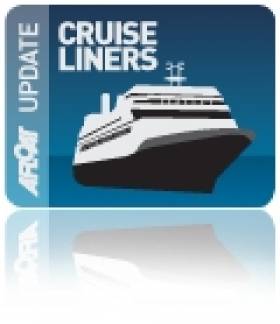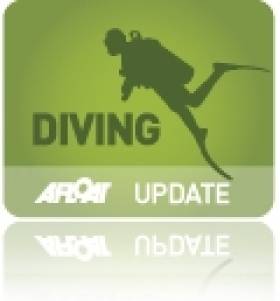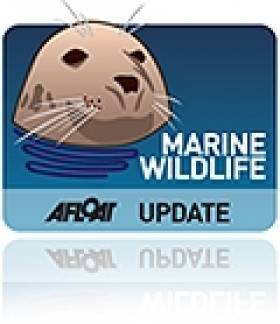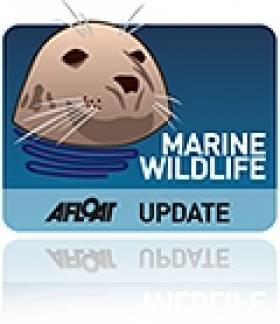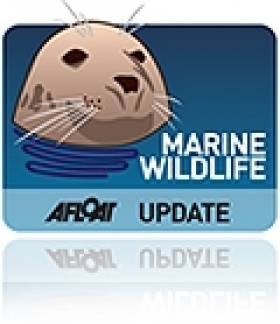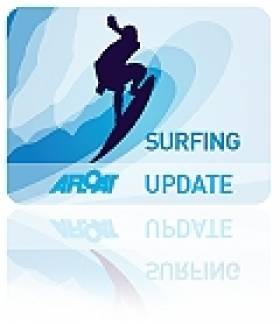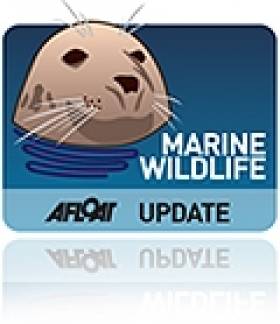Displaying items by tag: Donegal
Greencastle Visited by 51,000 tonnes Cruiseship
#CruiseDonegal – Having sailed from Belfast, the 51,000 tonnes Crystal Symphony anchored this morning off Greencastle from where as previously reported, Donegal Co. Council are backing the Loughs Agency to upgrade facilities.
The visit of Crystal Symphony is an impressive sized cruiseship to Lough Foyle. The €170,000 investment in Greencastle is to develop the lucrative cruise trade to the north-west. The aim is to increase cruise-based visitors to tour the Inishowen Peninsula, with Malin Head been the main destination attraction.
Crystal Cruises, operators of the ultra-luxury 900 passenger-plus cruise line won three first-place awards from CruiseLine.com's Bon Voyage magazine. The online publication's panel of experienced cruise editors chose the winners for the first annual Editor's Choice awards, giving Crystal five accolades overall – more than any other luxury line.
Among the categories won was for Best Refurbished Ship in which Crystal Symphony was awarded Silver. The 238m long cruiseship having recently undergone a $15 million redesign.
The redesign for example involved a newly-styled Avenue Saloon, one of the ship's most popular venues. The piano bar retains its 19th-century gentlemen's club feel with rich mahogany woods, buttery leathers, and luxe velvets. So click HERE for a peak and more!
Man Dies After Fall At Fanad Lighthouse
#Fanad - TheJournal.ie reports on the death of a man in his 60s who fell into the water at Fanad Lighthouse in Co Donegal.
The man was believed to be photographing the area when he slipped on a rock and fell into a gulley, which coastguard boats from Lough Swilly had difficulty accessing due to strong winds.
TheJournal.ie has more on the story HERE.
Diver Dies After Donegal Coast Incident
#Diving - RTÉ News reports that a man has died after a diving accident off the Donegal coast yesterday afternoon (Saturday 12 July).
The deceased, said to be in his 50s and a visitor to the area, was one of two divers who were reported in difficulty off St John's Point near Killybegs.
Bundoran RNLI's volunteer crew launched their lifeboat in response to the scene, near St John's Point Lighthouse, just after 4.30pm along with the Killybegs Coast Guard boat and the Irish Coast Guard helicopter Rescue 118.
On arrival they found that a man had been taken to shore, where he was being given CPR.
The casualty was transferred to nearby White Strand, where the helicopter could land, while CPR continued by an advanced paramedic from the lifeboat.
The man was then airlifted to Sligo General Hospital, where he later died.
His companion diver, a man in his 30s, was also transferred to the hospital.
The incident comes almost four weeks after the last diving incident in Donegal, when a man died following a rapid ascent to the surface during a dive at Malin Head.
That same weekend also saw the death of a Limerick diver at Roches Point, and since them there have been two more diving fatalities, after two men died in an incident while wreck diving off the West Cork coast earlier this month.
#MarineWildlife - Two of the stranded pilot whales at Falcarragh in Co Donegal have been refloated by locals against advice to leave them alone to die naturally.
According to RTÉ News, the public was warned away from the strand - now reported to be Drumnatinny beach - but a group met at first light this morning where they found four whales still alive in a pool of water and refloated two of them at high tide.
The locals said they watched the whales for several hours to make sure they did not strand themselves again.
But their actions still go against "internationally accepted" practice to leave whales that strand after being refloated to die in peace, as Irish Whale and Dolphin Group (IWDG) welfare officer Paul Kiernan explains.
Meanwhile, a visitor to the area has told the Belfast Telegraph of her horror over scenes on the beach where hundreds of onlookers gathered to see the beached whale pod.
Nicola Hinds from Bangor said some parents encouraged their children to interfere with the carcasses, while others photographed dying whales with camera phones.
She also criticised authorities for not handling the situation better, describing the scene as "an act of total wilful animal cruelty".
IWDG strandings officer Mick O'Connell has since written a column discussing the lessons to be learnt from this incident, calling for the State to establish official procedures for live strandings.
"It is time for State agencies to sit down and decide who has responsibility for live strandings in this country," he writes. "The relevant agency needs to have in place a coastal network of personnel trained in the latest 'best practice' guidelines for dealing with live strandings."
These guidelines, O'Connell adds, must be "backed up with appropriate authority to act as beachmaster when dealing with members of the public, the Gardaí and the Irish Coast Guard service."
Stranded Pilot Whales Being Left To Die Naturally
#MarineWildlife - More sad news from Ballyness Beach in Falcarragh this morning (8 July) as RTÉ News reports that all but one of the whales returned to the water after yesterday's mass beaching have stranded again and are being left to die.
Seven of the 13-strong pod have already been buried on the beach, with five more still alive but in no condition to be returned to deeper water, while one whale is unaccounted for.
#MarineWildlife - RTÉ News reports on the deaths of five pilot whales in a 13-strong pod that beached in Donegal this morning (Monday 7 July).
Despite valiant efforts by locals, four of the whales stranded Ballyness Beach in Falcarragh were already dead when the pod was discovered in distress.
Several whales also beached themselves again after a JCB was used to try to drag the surviving pod members out towards the sea. A fifth whale, a juvenile, died soon after.
It's hoped that the next high tide will help the remaining eight whales out of the shallows to deeper waters. RTÉ News has more on the story HERE.
The story brings sad memories of the more than 30 pilot whales lost in a mass stranding on Rutland Island some three-and-a-half years ago, and more recently the 16 pilot whales that died after beaching in eastern Scotland almost two years ago in similarly tragic circumstances.
Fisherman Dies Off Donegal Coast
#Inishowen - The Irish Times reports that a fisherman has died after his fishing vessel is thought to have sunk off Inishowen Head in Co Donegal this morning.
The alarm was raised by a local fisherman who spotted debris in the water, and the body of the mid-50s man was recovered by another boat some minutes later.
A subsequent coastguard search established that the man had been fishing alone in his 20ft vessel.
Riding The Cold-Water Waves In Dunfanaghy
#Surfing - Travel writer Pól Ó Conghaile has posted his recollections of surfing the wintery waters of Dunfanaghy in North Donegal.
With "waves you’d be hard pressed to find in Australia", the region proved to Ó Conghaile why surfing in Ireland is such a draw for world-class pros and land-lubber novices alike.
"Sheltered or exposed, facing every which way, throwing up all kinds of waves – sure, the water is cold, but with the right gear you can break out the board no matter what," he writes.
And there's more on the story at Pól Ó Conghaile's website HERE.
Fishing Boats Wrecked By Vandals In North Donegal
#BoatVandals - Gardaí in North Donegal are looking for vandals who wrecked two boats with a combined worth of over €10,000 off Downings Pier late on Tuesday night (17 September).
Donegal Daily reports that the fishing boats owned by local men were cut from their moorings and left to drift across the bay, where they were destroyed on rocks.
Gardaí at Carrigart are studying CCTV footage from the pier and have appealed to any locals who spotted people acting suspiciously in the area that night to contact them.
'World's First' As Researchers Attach Camera To Basking Shark
#MarineWildlife - Marine researchers have attached a video camera to the dorsal fin of a basking shark off Donegal in what's described as a "world's first".
RTÉ News reports that the footage captured by the team from the Irish Basking Shark Project, who affixed their camera to the giant six-metre shark off Malin Head last month.
Team spokesperson Emmett Johnston remarked on the basking shark bonanza off Donegal at present, commenting that the research "haven't seen sharks in such good numbers since 2010".
As previously reported on Afloat.ie, the gathering of beasts was a surprise for an angling kayaker who posted his own video of being 'stalked' by a basking shark off the Inishowen Peninsula.
But he was never in any real danger as despite their fearsome appearance, the gentle giants live on a diet of plankton.


























